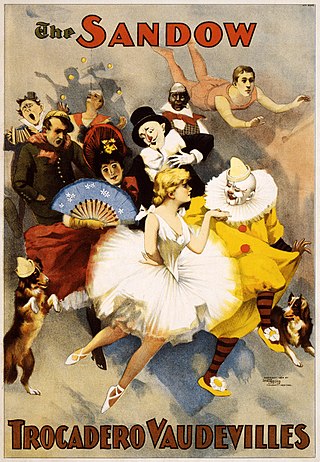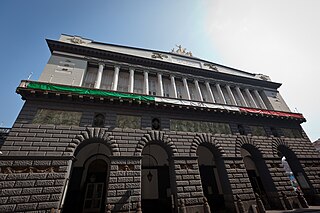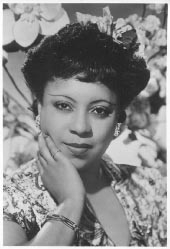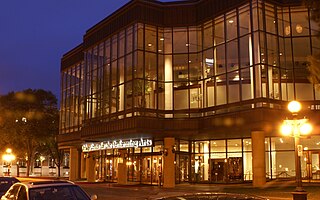Related Research Articles

Troyal Garth Brooks is an American country music singer and songwriter. His integration of pop and rock elements into the country genre has earned him popularity, particularly in the United States with success on the country music single and album charts, multi-platinum recordings and record-breaking live performances, while also crossing over into the mainstream pop arena.

Vaudeville is a theatrical genre of variety entertainment born in France at the end of the 19th century. A vaudeville was originally a comedy without psychological or moral intentions, based on a comical situation: a dramatic composition or light poetry, interspersed with songs or ballets. It became popular in the United States and Canada from the early 1880s until the early 1930s, but the idea of vaudeville's theatre changed radically from its French antecedent.

An opera house is a theatre building used for performances of opera. It usually includes a stage, an orchestra pit, audience seating, and backstage facilities for costumes and building sets.

Music hall is a type of British theatrical entertainment that was popular from the early Victorian era, beginning around 1850. It faded away after 1918 as the halls rebranded their entertainment as variety. Perceptions of a distinction in Britain between bold and scandalous Victorian Music Hall and subsequent, more respectable Variety differ. Music hall involved a mixture of popular songs, comedy, speciality acts, and variety entertainment. The term is derived from a type of theatre or venue in which such entertainment took place. In North America vaudeville was in some ways analogous to British music hall, featuring rousing songs and comic acts.

A bar, also known as a saloon, a tavern or tippling house, or sometimes as a pub or club, is a retail business establishment that serves alcoholic beverages, such as beer, wine, liquor, cocktails, and other beverages such as mineral water and soft drinks. Bars often also sell snack foods, such as crisps or peanuts, for consumption on their premises. Some types of bars, such as pubs, may also serve food from a restaurant menu. The term "bar" refers to the countertop where drinks are prepared and served, and by extension to the overall premises.

Thomas Henry Sargent, known professionally by his stage name Max Miller and billed as The Cheeky Chappie, was an English comedian often considered the greatest stand-up of his generation. He came from humble beginnings and left school at the age of twelve. At the outbreak of the First World War, he volunteered for the army. During his time in the forces, he started a troupe concert party. On leaving the army, he took up work as a light comedian, dancer, and singer. He toured extensively, appearing in variety, revues and by the early 1930s reached the top of the bill in the large music halls including the London Palladium.

Edward Harrigan, sometimes called Ned Harrigan, was an Irish-American actor, singer, dancer, playwright, lyricist and theater producer who, together with Tony Hart, formed one of the most celebrated theatrical partnerships of the 19th century. His career began in minstrelsy and variety but progressed to the production of multi-act plays full of singing, dancing and physical comedy, making Harrigan one of the founding fathers of modern American musical theatre.

Adelaide Louise Hall was an American-born UK-based jazz singer and entertainer. Her long career spanned more than 70 years from 1921 until her death and she was a major figure in the Harlem Renaissance. Hall entered the Guinness Book of World Records in 2003 as the world's most enduring recording artist, having released material over eight consecutive decades. She performed with major artists such as Art Tatum, Ethel Waters, Josephine Baker, Louis Armstrong, Lena Horne, Cab Calloway, Fela Sowande, Rudy Vallee and Jools Holland, and recorded as a jazz singer with Duke Ellington and with Fats Waller.

The Barbary Coast was a red-light district during the second half of the 19th and early 20th centuries in San Francisco that featured dance halls, concert saloons, bars, jazz clubs, variety shows, and brothels. Its nine block area was centered on a three block stretch of Pacific Street, now Pacific Avenue, between Montgomery and Stockton Streets. Pacific Street was the first street to cut through the hills of San Francisco, starting near Portsmouth Square and continuing east to the first shipping docks at Buena Vista Cove.

The Chatham Theatre or Chatham Street Theatre was a playhouse on the southeast side of Chatham Street in New York City. It was located at numbers 143-9, between Roosevelt and James streets, a few blocks south of the Bowery. At its opening in 1839, the Chatham was a neighborhood establishment, which featured big-name actors and drama. By the mid-1840s, it had become primarily a venue for blackface minstrel shows. Frank S. Chanfrau restored some of its grandeur in 1848.
"McNamara's Band" is a popular song composed in 1889 by Shamus O'Connor (music) and John J. Stamford (lyrics). The song was performed as a music hall routine by William J. "Billy" Ashcroft. It has been recorded by a number of artists, most notably Bing Crosby. The song is associated with Ireland and often performed on St. Patrick's Day in the United States.

Bishop McNamara High School(BMHS or McNamara) is a private, Catholic coed high school in Forestville CDP in unincorporated Prince George's County, Maryland.

The Ordway Center for the Performing Arts, in downtown Saint Paul, Minnesota, hosts a variety of performing arts, such as touring Broadway musicals, orchestra, opera, and cultural performers, and produces local musicals. It is home to several local arts organizations, including the Minnesota Opera, The Saint Paul Chamber Orchestra, and The Schubert Club. The president and CEO, Christopher Harrington, has served since November 2021, and Producing Artistic Director Rod Kaats has been with the Ordway since February 2018.

Niblo's Garden was a theater on Broadway, near Prince Street, in SoHo, Manhattan, New York City. It was established in 1823 as "Columbia Garden" which in 1828 gained the name of the Sans Souci and was later the property of the coffeehouse proprietor and caterer William Niblo. The large theater that evolved in several stages, occupying more and more of the pleasure ground, was twice burned and rebuilt. On September 12, 1866, Niblo's saw the premiere of The Black Crook, considered to be the first piece of musical theater that conforms to the modern notion of a "book musical".

Wilton's Music Hall is a Grade II* listed building in Shadwell, built as a music hall and now run as a multi-arts performance space in Graces Alley, off Cable Street in the London Borough of Tower Hamlets. It is one of very few surviving music halls and retains many original features.

The Olympia Theatre, known for sponsorship and advertising purposes as the 3Olympia Theatre, is a concert hall and theatre venue in Dublin, Ireland, located on Dame Street.
Brooks Barry McNamara (1937–2009) was an American theater historian, professor, and contributing editor of The Drama Review.
In 1862 in New York City, "concert saloons" were the fare for evening entertainment for the male population of the thriving metropolis. To cut down on the growing decadence and crime that came with it, the Concert Saloon Bill was passed to rein in loose morality in the city.
Midway Gardens was a 360,000 square feet indoor/outdoor entertainment facility in the Hyde Park neighborhood on the South Side of Chicago. It was designed by architect Frank Lloyd Wright, who also collaborated with sculptors Richard Bock and Alfonso Iannelli on the famous "sprite" sculptures decorating the facility. Designed to be a European–style concert garden with space for year-round dining, drinking, and performances, Midway Gardens hosted notable performers and entertainers but struggled financially and the structure was torn down in October 1929.
Hens' Teeth Women's Comedy Company is a woman-only comedy troupe based in Wellington, New Zealand founded in 1988.
References
- ↑ McNamara, Brooks (2002). The New York Concert Saloon: The Devil's Own Nights. Cambridge University Press. ( ISBN 9780521814782 | ISBN 0-521-81478-2)